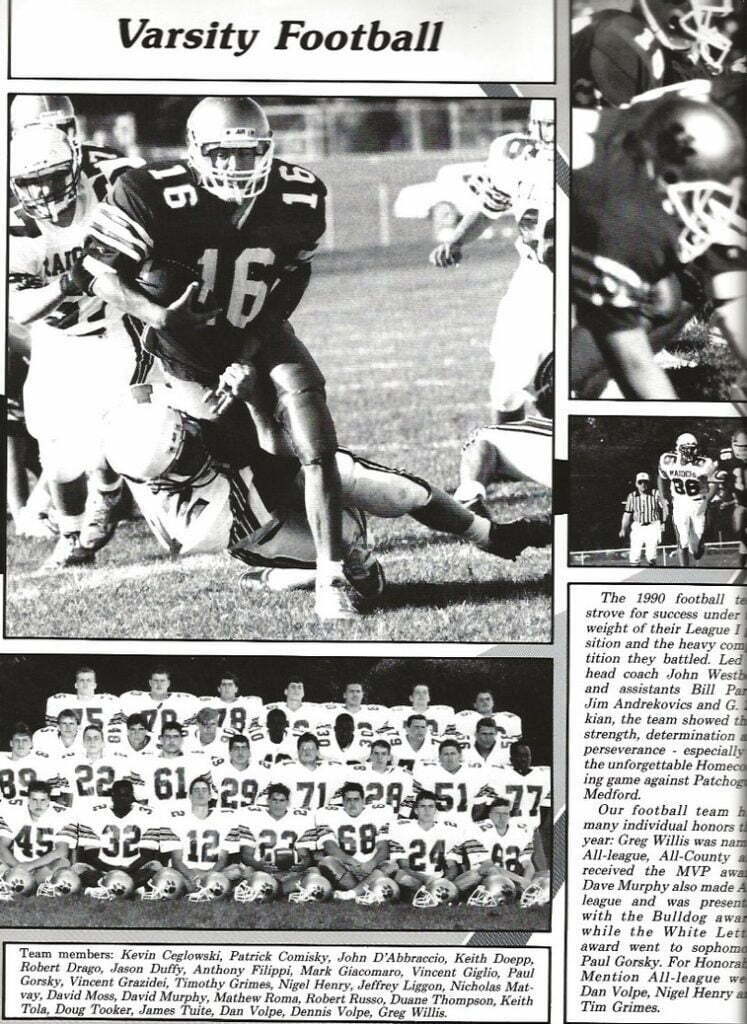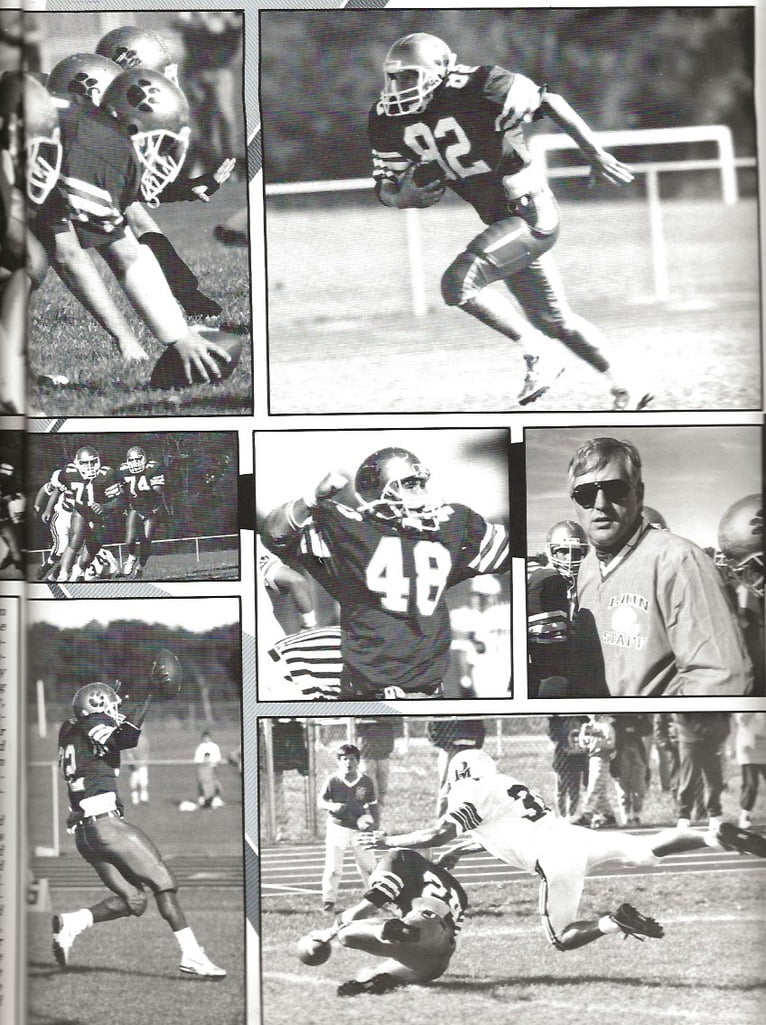

LIFE GOES ON Collotta tries for normalcy in face of cancer treatments and sudden death of father: [NASSAU AND SUFFOLK Edition]
Valenti, John. Newsday, Combined editions; Long Island, N.Y. [Long Island, N.Y]. 23 Sep 1990:
PRACTICE HAD just started and Chris Collotta, wearing all of his football gear, was off to the side of the field. This was back near the end of August at Half Hollow Hills West. At the edge of the field, Collotta paused a moment, breathing deep, sucking air into his lungs, almost wolfing it down, as he stood in the sun and took in a cool, late-summer breeze. He was back playing football again. And, to him, it felt incredible . . . like nothing he had ever felt before in his young and fragile life.
It was a thought that lasted all of a moment. Then, Collotta said, he felt as if he actually might want to sit down and cry.
It was understandable. Because as Chris Collotta stood there that afternoon, he understood that, by all rights, he shouldn’t have been there at all. And worse, he knew that his father, Bob, who had been the coach at Hills West, should have been. And wasn’t.
This is a story about life and death, about courage and survival. It is the story of Chris Collotta, a 17-year-old kid with a will to live. The story of how he has survived cancer – only to live with the death of his father, who was felled last spring by a heart attack.
“If you saw him, you’d never realize what he’s been through,” said Anthony Grimaldi, who replaced Bob Collotta as the coach at Hills West. “I mean, this kid has been through so much in the past two years. I never thought he could be this strong, that anyone could be. But he has such determination, such will. It is incredible. You’ve got to give him all the credit in the world.”
Two years ago, Chris Collotta was a football player at Longwood – a good one, not a great one. Still, he was ecstatic when he made his varsity debut at wide receiver against Ward Melville on Sept. 24, 1988. Four days later, he woke with a sore throat. Then, after practice, his neck appeared swollen. So, Collotta went for an examination and an X-ray at Mather Memorial Hospital. What he learned was that he had lymphoma – a form of cancer similar to Hodgkin’s disease, only more severe.
He had lesions all over his lungs. Doctors told him he might not live out the week and, probably, would not survive the year.
“It was a shock,” Collotta said. “It felt weird. Everything was so quick. I went in, they told me there was a problem, then I went for an immediate biopsy, then radiation. I also had chemotherapy and I got really, really sick. I was 15. It was hard.”
Collotta went for treatments at the Memorial Sloan-Kettering Cancer Center in Manhattan. He got sick, got better, had a relapse, got a fever, got worse, then got better again. That went on for a year, before Collotta was well enough to practice again at Longwood. He couldn’t play much – and a few people thought it unwise for him even to make the attempt.
But he wanted football, wanted something that would maintain some sense of normalcy in his suddenly out-of-control life. So he tried. All the time he received encouragement from his father.
“He’s coming in with a scratchy throat, and within an hour they’re telling us, `Hope that it’s Hodgkin’s,’ ” Bob Collotta said at the time. “I was going to step down {as coach}, but he thought that was ridiculous. This kid knows what’s expected of him.” He knew he had to survive. And so, together, they both went on.
After making the team last season at Longwood, Chris Collotta transferred to Hills West for the spring semester. He made the daily ride into school from Middle Island with his father, then left some afternoons to undergo treatment at Sloan-Kettering. He was determined to beat cancer and remain active. The ordeal brought father and son closer together. Chris went out for the baseball team at Hills West. He made it as a first baseman. His father was the coach.
“I was sick most of the time, so I didn’t play much,” he said. “The treatments affected my motor skills, my coordination. I really practiced more than I played. But I found out that it is fun to play for your father. I really enjoyed it.”
Chris Collotta was on his way back, making startling progress. His cancer was in remission, his future more promising. He made plans to play football for his father in the fall. Then, on May 13, Bob Collotta died. He was 42.
Chris was in shock. Where a father once had feared he would lose his son, a son now had lost his father. “He was devastated when it happened,” Grimaldi said. “He and his father were close. I think it came as a shock to him. It had to be difficult.”
It has been. But, drawing strength from his mother, Kathleen; his sister, Michelle, who is a cheerleader at Longwood; brothers Kenny and Anthony and his friends, Chris Collotta has gone on. He elected to stay at Hills West, where teachers are donating a percentage of their weekly salaries to help with his medical bills and coaches have helped organize a charity golf tournament, scheduled for Oct. 8 at the Marriott Wind Watch. He went out for the football team – though it now is coached by Grimaldi. He practices at his own pace – sometimes an hour, sometimes two, sometimes a full practice and sometimes none at all, depending on how he feels. He is scheduled to remain on chemotherapy until the middle of December and, then, if all goes well, he will never have to go through it again.
“There are some days when we’ll practice and Chris will just move off to the side of the field after a while and he’ll sit there and catch his strength,” Grimaldi said. “It is a drain on him. But what are you going to tell the kid, `You can’t play?’ Just the idea that he is still on the field after all he has been through is amazing. If he can do it, he’ll do it.”
Collotta did miss practice earlier this week. He was home, in bed, recovering from his latest chemotherapy session. He was nauseous, weak. In a span of five days he had lost 15 pounds. Still, his mind was not on his sickness. It was on football, on school – his average is in the high 80s. And on Hills West’s upcoming game, yesterday, against Riverhead. Hills West lost, 14-7; Collotta played half the game.
Having faced so much hardship, all he can do is look to the future and not dwell on the hurt of his past.
“It’s hard to explain how I’ve dealt with this,” he said, trying to make himself sound like more than just a survivor. “I just go on, I guess. There are things about all this that bother me, of course. I am not impervious to it all. It’s a hard situation. But there is nothing I can do about it.”
His voice trailed off a little. “All I can do is go on with my life,” he said. “So I do.”
Meet Connetquot, 1990. Rising from the ashes, the Thunderbirds built a 25-0 first-half lead against Longwood, as their relentless running game racked up 289 yards and their defense tamed the Lions. Connetquot scored its first touchdown on a dazzling 57-yard punt return by Chad Bosch, who fielded the ball, broke two tackles, spun off a third man near the left sideline, cut back to the middle and outraced the CONNETQUOT on Page 20 CONNETQUOT from Page 17 field to score with 6:38 left in the first quarter. Then Craig Amarando, who gained 113 yards on eight carries, scored on a 10-yard run set up by a 79-yard run by Andrew DeLuise.
The Thunderbirds also scored on a 1-yard touchdown by Schramm, before DeLuise, who gained a game-high 128 yards on 17 carries, made it 25-0 on a 16-yard run with 30 seconds left in the half.
Longwood never had a chance. If it wasn’t the defensive line harrassing quarterback Greg Willis (9-for-27, 91 yards, four sacks), it was Bosch making two interceptions. And things weren’t much better on the ground for Longwood, as Jeff Liggon, who scored on a 7-yard pass with 7:23 left in the game, was held to 60 yards on 17 carries.
“They’re not the same team they were last year,” Longwood coach John Westberg said. “But they’re still good.”
“Last week I came into the locker room and sat there for like an hour, not moving, not knowing what to think,” Schramm said. “It was depressing, embarrassing. We thought we could go out and, because we were Connetquot, we’d win. This week, we came out and said, `We have to play football. We have to be us.’ Today we were. This was Connetquot.”
The new Connetquot. Maybe a step slower, a bit less talented, perhaps only one of several good teams in Suffolk. But a team these kids can live with. LONGWOOD 0 0 0 6 6 CONNETQUOT 6 19 0 0 25
C – Bosch 57 punt return (pass failed)
C – Amarando 10 run (Moran kick)
C – Schramm 1 run (kick failed)
C – DeLuise 16 run (kick failed)
L – Liggon 7 pass from Willis (pass failed) Sept. 23
Floyd 23, Longwood 8: Longwood‘s Jeff Liggon scored on a 90-yard run to cut Floyd’s lead to 13-8, but a botched Longwood punt set up Kimble Ware’s 11-yard touchdown run midway through the second quarter as Floyd put the game out of reach. FLOYD 7 13 0 3 23 LONGWOOD 0 8 0 0 8
F – Conklin 2 run (Bahr kick)
F – Cooke 1 run (Bahr kick)
L – Liggon 90 run (Volpe run)
F – Ware 11 run (kick failed)
F – FG Bahr 34
Sachem 35, Longwood 0: Larry Burns had touchdown runs in each of the first three quarters, including a 36-yarder on Sachem’s first possession. Burns scored from 65 yards out 4:05 before halftime and finished with 210 yards on 17 carries. Defensive end Jimmy Sullivan had three sacks and teammates Vinnie Hannigan and Ken Wilson added six solo tackles each. LONGWOOD 0 0 0 0 0 SACHEM 7 6 8 14 35 – Oct. 28
S – Burns 36 run (Bauland kick)
S – Burns 65 run (kick failed)
S – Burns 14 run (Nook pass from LaRocca)
S – Shanahan 2 run (Bauland kick)
S – Izzo 7 run (Bauland kick)
